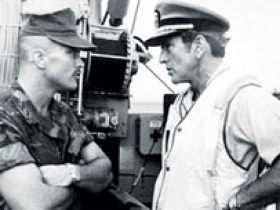
In 1994 I made my first trip back to Vietnam since the war.Little did I realize then the impact that trip would have on my life. It launched me on a journey to conduct research about the war, but from a viewpoint few Americans appreciated—that of the enemy we had fought there.
By the time I completed my research, I had completed more than 50 trips to Vietnam and interviewed hundreds of Vietnamese veterans. That research was detailed in the stories of those veterans I shared in my book “Bare Feet, Iron Will.” The book was published in the US in 2010 and in Vietnam in 2011 after being translated into Vietnamese. “Bare Feet, Iron Will” has been described by the Vietnamese media as one of the most remarkable books written in 2011.
Among the many Vietnamese veterans I interviewed, there were several who stand out in my mind. One of those is brigadier general Nguyen Don Tu. A gentle soul, General Tu held no animosity towards me personally. I say that, not because I was a Vietnam veteran but because it was my father who was responsible for the US Navy’s use of the chemical defoliant Agent Orange which may well have been responsible for severe disabilities suffered by General Tu and his own daughter.
General Tu was someone whom, once met, left you feeling you had known him a lifetime. I returned to Hanoi several times during the course of my research to meet with him and his lovely wife, Vu Phuong Mai. Both always welcomed me as family. It was, therefore, with great sadness I learned of the General’s death in 2009. When he passed, it was as if I had lost a family member as well.
When I returned to Vietnam in April 2011 to start the launch of my book there, I made the trip to Hanoi to meet with General Tu’s widow. The smile she showed me upon my arrival betrayed the sadness she still feels over her beloved husband’s death. But it was a good experience for me to see, once again, a family member and to learn about her children and grandchildren.
She told me that her grandchildren, Hoang Huong Tra My and Hoang Nhat Nam, were studying in a college in the United States. Both attended Randolph College in Lynchburg, Virginia, which is only a three-hour train ride from my home outside Washington, DC. I asked Mai to have her grandchildren contact me and we would try to get together with them.
Just before Thanksgiving Day in the US—in November—I received an email from My who introduced herself and her brother. I invited them to join my family for the holiday. It was with great excitement we greeted My and Nam when they arrived at our home the day before Thanksgiving. We immediately bonded with them and, unsurprisingly, by the time they had to leave to return to college two days later, felt we were saying goodbye to family members.
We extended an invitation for them to join us for Christmas and New Year as well—and were very pleased when they accepted. As they visited us for the holidays, we made a point to talk with their mother, Nguyen Lan Thai, and grandmother, Mai, regularly by means of skype. In this manner, I enjoyed having the opportunity to introduce them to my wife, Karin, who has now adopted My and Nam as their American mother!
As 2011 draws to a close and a new year will soon be upon us I cannot help but reflect on my relationship with General Tu’s family and what it says about the human character. Decades ago General Tu and I were on opposite sides of the battlefield. Had we ever met face-to-face in that conflict, the result of our meeting then would have been much different from that of our meeting long after the war. he passage of time had given us both the opportunity to greet each other as fellow human beings, motivated by the mutual desire to get to know each other in that light.
By his humanity, General Tu gave me the opportunity to get to know a remarkable man and a remarkable family. As I observe his grandchildren now, living in my home and enjoying the humble surroundings and environment we can provide them, I can only reflect on how life has changed in the decades since the Vietnam war has ended. I have come to realize the emptiness in my heart left by General Tu’s death is gradually being filled by the happiness I continue to enjoy with the visits of his grandchildren to my home.
As 2012 begins it is my fondest hope that all the problems existing between the US and Vietnam to which the twentieth century may have given rise will be fully extinguished in the year ahead. In so doing, it is hoped the love and humanity that now bonds together General Tu’s family and mine will be achieved by millions of other Americans and Vietnamese families as well.
Chuc Mung Nam Moi!
James G. Zumwalt (L) is the younger son of Admiral Elmo R. Zumwalt, Jr. (R), who became commander of the Naval Forces, Vietnam, in 1968. James and brother Elmo III served in Vietnam during their father's command.
Admiral Zumwalt approved the use of Agent Orange during the war and, after his eldest son succumbed to cancer caused by dioxin in 1988, he became a leading advocate on behalf of veterans afflicted with diseases stemming from exposure to the defoliant.
James G. Zumwalt
Source: thanhniennews.com






